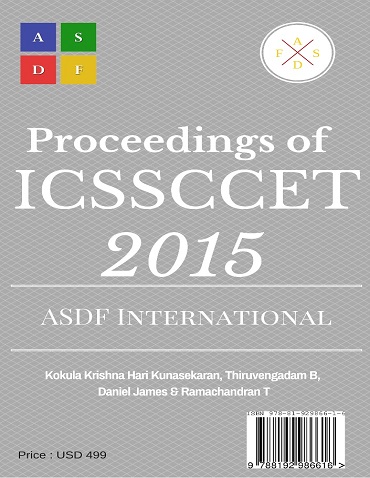- Publication Meta:Value
- Short Title:ICSSCCET 2015
- Publisher:ASDF, India
- ISBN 13:978-81-929866-1-6
- ISBN 10:81-929866-1-6
- Language:English
- Type:Hard Bound - Printed Book
- Copyrights:ICSSCCET Organizers / DCRC, London, UK
- Editor-in-Chief:Ramachandran T
- Conference Dates:10 - 11, August 2015
- Venue Country:Karpagam Institute of Technology, Coimbatore, India
- Submitted Papers:410
- Acceptance Rate:4.11%
- Website:www.icssccet.org
Welcome to ASDF Electronic Digital Library!
ICSSCCET 2015
ICSSCCET 2015
International Conference on Systems, Science, Control, Communication, Engineering and Technology 2015
Paper 034
Intelligent Ticketing Mechanism for Public Transport
R Monisha1, P Sandhiya2
1,2Assistant Professor (Karpagam Institute of Technology),
Department of Electronics and Communication Engineering
Abstract
We often come across the pathetic scene of roadside bystanders patiently waiting at the bus stop for a bus to take them to their destination in time safely. The anxious, tired and pathetic face tells the entire story behind the misery and fate. The helplessness of the authorities is another story difficult to gulp. The proposed project work will totally eradicate this problem by taking care of the scheduling of vehicles. With the modern device possessed by the conductors of the vehicles, the owners can get instant collection details, scheduling other vehicles, tracking the movement, etc. Further using GPS technologies, position, arrival and departure of the vehicle can be flashed to all stake holders at all bus stations. While deciding the logic and coding, focus is laid on user friendly approach. Since the days are not far off for remote operated vehicle this can be the first step to prepare the citizen to adopt for a sea change in futuristic passenger travel The additional part of the same project work is presented here. Use of paper tickets in public transport is a prevalent practice. However, this system has its own drawbacks; the exact amount has to be tendered, keep the small ticket safely till the journey end. It is said that the job of a town bus conductor is the most difficult job to perform. The conductors’ plight cannot be surmounted with words, his brain is a live CPU doing all the multitasking and still stay cool, (even computers get hot and has a fan ) towards all kinds of passenger behavior and comments. Should ask for the destination, ticketing, collecting and tendering changes in rupee notes and coins, announcing the place of arrival, directing the passengers to get packed properly, answering unruly passengers, ensuring the door step people on safety thereby ensuring escape from penalties, self recording the transactions while jolting, rocked to face the inspectors, and the list goes on. This project work seeks out a visible technical solution using modern technologies to come out of these chaoses. It is proposed to use smart cards to avoid ticketing and money collection and tendering of changes. The destination is to be entered and all relevant details of the journey are displayed in the handheld device which is available with the conductor. The passenger upon swiping his ticketing smart card will immediately get a message on his registered mobile detailing the journey particulars, the balance amount in his travel card and its validity.
Keywords
Author's Profile
Author profile can be generated and linked through our partners World Book of Researchers. To include your profile online Click Here. After it is approved, please email to edlib @ asdf.res.in to create a link with all the papers.
e-AID
ICSSCCET.2015.034
Cite this Article as Follows
R Monisha, P Sandhiya. "Intelligent Ticketing Mechanism for Public Transport." International Conference on Systems, Science, Control, Communication, Engineering and Technology (2015): 159-162. Print.
© 2010 - by EDLIB .
All Rights Reserved.

